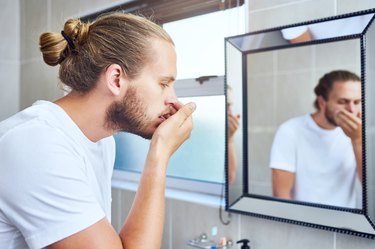
It's always a questionable decision when, in a movie, two people roll over in bed in the morning and give each other a rather intimate kiss. But maybe, unlike you and me, they just don't have bad morning breath? Is that even possible?
OK, so morning breath fits under the category of halitosis, Rob Raimondi, DDS, co-founder of One Manhattan Dental in New York City, tells LIVESTRONG.com. The smell is "the result of bacteria in your mouth digesting leftover uncleaned food debris on your teeth, gums and tongue," he explains. As this hardens into plaque over time, the aroma worsens.
Video of the Day
Video of the Day
What sets overnight halitosis apart, though, is that you're constantly producing saliva during the daytime that washes away this food debris and helps keep your mouth clean and breath fresh.
During sleep, though, your body's metabolic processes slow, and saliva production decreases, Bruce Valauri, DDS, chief dental officer with ProHealth Dental in New York and New Jersey, tells LIVESTRONG.com. Dry mouth naturally increases the stink factor. Breathing through your mouth when you snooze, smoking and drinking alcohol often make this worse.
What's more, everyone has a different balance of oral bacteria, amount and quality of saliva, and some people don't accumulate a lot of plaque in their mouth, Dr. Valauri says. Meaning: Some people's morning breath just won't be as bad as other's. Maybe that's why your partner doesn't mind going in for that kiss…
How to Prevent Morning Breath

Brushing your teeth in the a.m. is the answer. Drink some water when you wake up to moisten your mouth. Then, if your schedule allows, it's best to eat breakfast first and then brush your teeth, Dr. Valauri says. If not, then brush your teeth after you get out of bed.
Swishing with mouthwash only will not help alleviate bad breath, Dr. Valauri says. "These do not last long in your mouth. They are only a breath freshener for the moment," he says. The same goes for gum.
Beyond brushing, there are a few things you can do to tame your bad morning breath and keep your mouth as fresh as possible:
1. Brush and Floss at Night
Don't even think about jumping into bed without flossing. The American Dental Association (ADA) recommends flossing once per day. (It can take 12 to 24 hours for plaque to form, Dr. Valauri says.)
When you floss during the day is up to you, the ADA says. But there's an advantage to getting the gunk out at night because it will help get your mouth as clean as possible heading into bed.
Also, brush your teeth for two minutes; an electric toothbrush will most effectively clean surfaces, Dr. Raimondi says. Bonus: Many of these toothbrushes also keep track of the time you spend brushing, so you can't skimp.
2. Scrape and Rinse
Brush your tongue with a tongue scraper, Dr. Raimondi suggests. Follow up with an alcohol-free mouth rinse. (You want to skip the alcohol because it will dry out your mouth.)
3. Avoid Certain Foods
Onions and garlic may add tasty flavor to your meals, but they also tend to have long-lasting effects on your breath. If you're looking to avoid morning skunk breath for whatever reason, then consider avoiding these types of foods for dinner.
Related Reading
4. Pop an Oral Probiotic
These products "introduce good supportive bacteria into your mouth to prevent disease-causing bacteria to thrive," Dr. Raimondi says.
He recommends TheraBreath Oral Care Probiotics, which are chewable lozenges.
5. Treat Underlying Conditions
Some medical conditions can set the stage for bad morning breath, including sleep apnea (you're more likely to sleep with your mouth open and/or snore, which dries out your mouth), as well as acid reflux or GERD, Dr. Valauri says.
If you have (or suspect you have) one of these conditions, see your doctor about treatment options.
6. Go to the Dentist
The ADA doesn't have an official recommendation for the number of times you need to see your dentist each year. Instead, that's best left up to you and your dentist based on your past and current oral health, while taking into account your insurance coverage.
Dr. Valauri recommends going at least twice per year for a comprehensive exam, and making sure you are up-to-date on X-rays, as well. Tooth decay (aka cavities), infections and gingivitis-related bone loss all majorly factor into bad breath, including bad morning breath — so it's best to prevent these problems or get them treated ASAP.
Related Reading
Was this article helpful?
150 Characters Max
0/150
Thank you for sharing!
Thank you for your feedback!
Is this an emergency? If you are experiencing serious medical symptoms, please see the National Library of Medicine’s list of signs you need emergency medical attention or call 911.